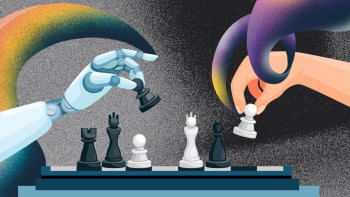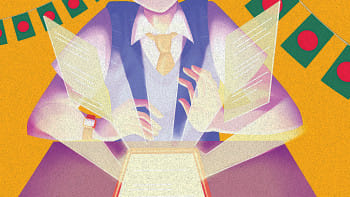Homecoming with a purpose

You can't see air. But if you breathe into a balloon, your air takes shape. The inflated balloon is no longer the shape it used to be. You look at it with pride, as if you have poured your spirit into it. It can either join other balloons to be part of a party or be a stand-alone object with trepid bounces.
The July uprising caused different invisible shapes to emerge that visibly changed the political landscape of the country forever. The spirit of the uprising emanated from the hearts of Bangladeshis, both domestically and internationally. At a time when freedom of expression was muffled at home, the call for change by our compatriots abroad kept the hope alive. Some of them even signed up for a reverse brain drain scheme, pledging their commitment to national recovery.
The country is still in the process of redefining itself. The spirited balloons are far from homogeneous. That's how it should be in a democracy. Unfortunately, the lack of democracy for such a long time has made us forget many of its basic tenets. It's easy to be dispirited by the change, or the lack of it.
One beacon of hope is available in the tiny streak of reverse brain drain that we are witnessing today. Dr Yunus's transitional government has been successful in crafting this inflow. The chief adviser has brought in policy experts such as Ali Riaz and Prof Mostak Hossain, economist Lutfey Siddiqi, and investment banker Dr Ashik Chowdhury (Bangladesh Investment Development Authority), among others, to invigorate the administrative system. These returnees bring home more than their resumes. They bring a touch of international standards that were not always accepted at the national level. Their inclusion is as talismanic as footballer Hamza Choudhury, who, in his first appearance in national colours, gave the opponent a lot to think about in Bangladesh's new outfit.
I watched BIDA Executive Chairman Ashik Chowdhury's presentation at the Bangladesh Investment Summit 2025, which has gained considerable attention. Even an adviser on my friend list was amazed by the presentation, saying no civil servant could pitch Bangladesh so smoothly. Maybe he is right. Then again, I see many of our students present in classrooms or at international debate meets, making equally impressive presentations. The problem is speakers with native accents or international exposure do not normally hold the posts reserved for civil servants recruited through typical exams that rely on rote learning. So, I would have been much more impressed if our homegrown products were making the much-hyped pitch. To achieve that, we need to reform our classrooms and our educational institutes. Short-term visits by our expatriates can never yield a sustainable outcome. It's time for us to create our cohort of academics, entrepreneurs, and policymakers who can join hands with our expatriates to participate in the global knowledge economy.
When a transformed Ashik Chowdhury makes his return from Singapore, many of us share the pride of knowing him at Dhaka University's IBA, Sylhet Cadet College, or the local organisations he worked for. But in most cases, the real change in our expatriate scholars occurs in an overseas system that is not didactic like ours but dialogic—that is not siloed like us but collaborative. To keep producing more local idols, we need to redesign our institutions and system. To begin with, we need to introduce TNE (Transnational Education) models to our local system. We can work with foreign partner institutions to create hybrid curricula aligned with global standards. For instance, a Ford Foundation Financial Assistance Program led to the founding of IBA in 1966 in collaboration with Indiana University, Bloomington, US. The graduates of IBA are now making their marks in almost every imaginable sector, both at home and abroad.
To increase international collaboration, we need to mentor faculty and students in grant writing, peer-reviewed publishing, and research ethics. Those who previously pledged to return but have not yet made themselves available can help us initiate the networks to secure funding, mobility, and visibility. With less than 2 percent of GDP assigned to education, against the UNESCO-prescribed 6 percent, higher education is a resource-constrained sector. With the help of our overseas friends, we can prepare ourselves to make our mark on the international stage.
Having said that, as a nation that prides itself on being "porosrikator" (getting ill by seeing good in others), we also need to be wary of the possible backlash. The underpaid and overburdened local academic system often lacks the heart to welcome "foreigners." It responds by erecting walls against what seems foreign or threatening.
Our public universities, for instance, implement a gatekeeping system for hiring and promotion. They prefer recruiting their own (and foreign nationals are not allowed to apply). There is scepticism towards new teaching methods. Ideological opposition often masks professional insecurity. The bureaucracy excels at manipulating red tape to create administrative obstacles for foreign ideas or individuals.
Many returnees return with a lot of passion. But during their early stages of reintegration, they feel that their passion is met with passivity, innovation with indifference, and idealism with bureaucracy. As a consequence, many returnees feel emotional burnout and cynicism, resulting in their quiet withdrawal and return to their adopted homes.
So the challenge for us is to retain quality in a system with resistance. The returnees may have an idealistic view of achieving excellence. But they must work in a system where most may lack training, resources, or the will to change. Their desire to introduce high standards might end up alienating them from their colleagues. Any top-down approach should be avoided. If the imported leaders behave in a know-it-all manner, they are likely to alienate their colleagues. Instead, they need to work horizontally, not hierarchically. We need to collaborate with our visiting mentors to initiate micro-reforms in course design, assessment, or research, for instance. Through mentorship, shared aspirations can be practised, aimed at merging local and global voices.
We must acknowledge the returnees' sacrifice and emotional labour, knowing we can't repay them in cash. To build a bridge between locals and returnees, networks of solidarity are essential. The terms of reference for engaging the returnees need to be more than a phone call from the top. We need to guarantee their academic freedom and meaningful roles as well as their public recognition.
The returnees will be our role models not because they are foreign-trained but because they care enough to come back and stay. They can rewrite the myth of exodus and ignite belief in possibility among the young generation. Their very presence will reaffirm that you don't have to leave to succeed. You can return and make a difference.
While the return of Bangladesh's global citizens to the country is a welcome trend, we need to be strategic in making their integration meaningful. Not doing so will kill their passion and ruin the system they came back to fix. We need to make room for them not just institutionally but imaginatively. Universities can be redesigned to accommodate their ideas and translate them into the creation of a new Bangladesh that is confident, curious, and connected to the world.
The big question isn't whether the returnees will stay. It's whether we will give them the required space worth staying for.
Dr Shamsad Mortuza is professor of English at Dhaka University.
Views expressed in this article are the author's own.
Follow The Daily Star Opinion on Facebook for the latest opinions, commentaries and analyses by experts and professionals. To contribute your article or letter to The Daily Star Opinion, see our guidelines for submission.

 For all latest news, follow The Daily Star's Google News channel.
For all latest news, follow The Daily Star's Google News channel. 






Comments